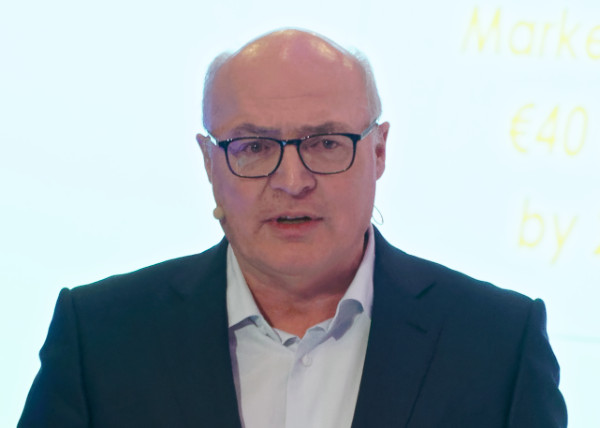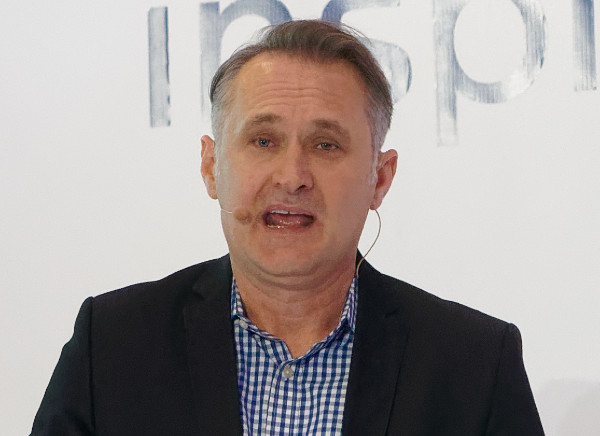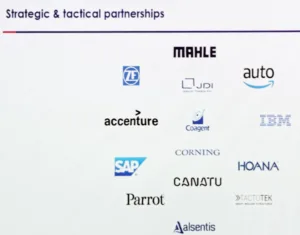Faurecia is a supplier to the automotive market that supplies interiors and systems. The company is in the process of acquiring Parrot (the auto audio specialist) and also has invested in touch supplier, Canatu as well as a number of companies in China. (Faurecia Takes On Chinese Automotive Firm, Canatu Touch Used by Daimler) This year was the first time that the firm has held a press event at CES.
 Faurecia’s Patrick Koller. Image:Meko
Faurecia’s Patrick Koller. Image:Meko
The first speaker at the event from Faurecia was Patrick Koller, the company’s CEO who came on after the obligatory corporate video. His focus was ‘smart life on board’. In the future, he believes, consumers will buy cars not based on the power train, but on the interior features. Faurecia is the only remaining supplier in the industry that deals with “all the surfaces” in the car, Koller said, and cars will be more sophisticated and complex to deliver.
What does the customer need in the car is a real question and the firm started with looking at use cases and developing from there. For the last 15 years there have been few innovations in the interior of cars. Koller also pointed out that for three passengers in a full car, the car is already ‘autonomous’. Remembering that helps the company to understand the future use cases.
Predictive and Personal Systems Needed
Systems that are predictive and personal are essential and users will need help to use the data they bring via their smartphones. Faurecia has both tactical and strategic partnerships in this area and the company is at CES because the concepts of the past are quickly becoming realities.
Faurecia has both tactical and strategic partnerships. Note JDI. Image:Meko
Safety is essential and that causes trouble for seat belts and air bags if the seat rotates – so the safety devices will have to migrate to the seat itself. It is essential that both transitions and fixed positions are safe – which they are not all today in design concepts. The company is working with ZF of Germany on this topic. You need AI to understand traffic conditions and the use of different positions for people in the car and the positions will be adaptively dynamic, modifying according to conditions.
Koller said that personally, he hates the music he is listening to being interrupted by GPS and doesn’t like listening to others’ mobile conversations or music and that kind of thinking means it is good if you can individualise the in car experience. For example, only the driver needs the GPS data. Speakers may not be used for audio any more in the future – surfaces can be directly used to create audio. Inside the car users will want what they can get outside the car. You trust the sources that you use outside the car and you need them in the car. Koller said that he has an expensive car, but doesn’t use the factory GPS as he prefers Waze and that’s crazy.
 Amazon’s Nick Curic looks after Alexa – he’s a busy man! Image:Meko
Amazon’s Nick Curic looks after Alexa – he’s a busy man! Image:Meko
Amazon – Ned Curic is VP for Alexa Automotive at Amazon. Alexa can already do ‘thousands of things’ and does new things every day. Very unique scenarios can be built for different use cases. Voice is here to stay and customers like Alexa at home and now want it in the car. Amazon is working with Faurecia to develop a cockpit with Alexa – and Nuric is happy with the Faurecia demo which shows how multiple users can have their own isolated audio areas. There are many applications in the car for voice control.
Koller then came back and said that the firm is working with Accenture to develop enhanced health and wellness – you should leave the car feeling better at the end of the journey, he said. Faurecia can measure and monitor your stress and your reactions when you are in a car and over time, the company and its systems will learn how to make things better. However, drivers should not get too relaxed and Faurecia can ensure that you don’t go to sleep if driving!
Accenture is Working on AI for Cars
Marc Carrel Billiard is a Senior Managing Director for Accenture and is the Labs Global Lead and he said that his company is strongly committed to helping people feel better. It gets $18 billion of revenues from digital services and spends $700 million on R&D which is global. A lot of the firm’s work is about how to use collected data for prediction and a lot of that is about combining technologies. For example, if you have a bad back, the system may know this because there is an appointment with a chiropractor in the driver’s agenda. On that basis, the seat in the car could be specially adjusted.

Billiard said that “Accenture is about delivery as well as innovation” and the company likes to be able to deliver solutions at scale.
In response to a question, Koller said that the deal is not exclusive with Alexa, which is working with a number of suppliers in the automotive space. There is no overall exclusivity, but the multi user technology is unique and he said that, using his earlier classification, Amazon is a tactical partner, while Accenture is a long term strategic partner.
Typical drivers spend 500 hours per year in the car and in that time they don’t move much, so you can analyse health, for example looking for conditions such as epilepsy or othet health issues. Being able to deal with risky conditions which could be monitored may increase the mobility of sufferers. Koller said that data collection is critcal for health management.
Analyst Comment
The observation about the safety issues were very interesting. Concept cars like the one shown by Panasonic on the show floor really don’t take into account the problems of seat belts and air bags. At the moment, the driver is in quite a fixed position and these safety devices can be fitted to the chassis of the car. If the user is moving around, this isn’t easily feasible. The safety fittings have to be applied to the seat, but that also may mean significant changes being needed from the light and mobile seats seen in many concepts.
Alexa was seen in a lot of places at CES. Toyota will put the technology in the Camry and Sienna this year and although Alexa is already in Ford, Nissan and BMW cars, Toyota is the biggest car maker globally. Garmin introduced a widget to talk to Alexa in the car and Roav has the ‘Viva’ a $50 plug in for the car’s cigarette lighter (or accessory power output as it is now called). Byton captured a lot of attention and it has Alexa which is also being adopted by ChargePoint which is developing a skill for controlling electric vehicle charging. Panasonic will put Alexa into the Skip Gen IVI infotainment platform from Panasonic and Elektrobit also added support. (BR)

